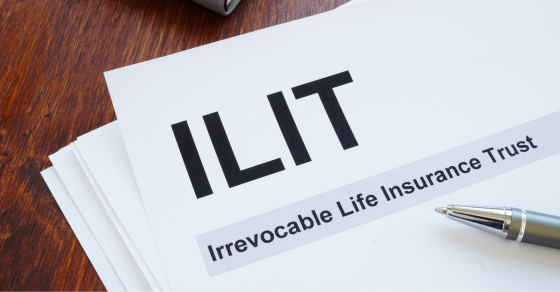
Life insurance can provide peace of mind, but if your estate will be large enough that estate taxes will be a concern, it’s important to not own the policy at death. The policy’s proceeds will be included in your taxable estate and may be subject to estate tax. To avoid this result, a common estate planning strategy is to draft an irrevocable life insurance trust (ILIT) to hold the policy.
Generally, the proceeds of a life insurance policy aren’t included in your taxable estate if you don’t own the policy. However, life insurance proceeds will be included if you possess any “incidents of ownership” over the policy. This goes beyond mere ownership. If you have the right to amend the policy — say, by changing the beneficiaries — or you can borrow against the cash value, it’s treated as an incident of ownership.
Avoiding incidents of ownership can be important because the top estate tax rate is currently 40%. Fortunately, with your gift and estate tax exemption, you can shelter up to $12.92 million (for 2023) of assets from federal gift and estate tax. But be aware that, without congressional action, after 2025 the exemption is scheduled to revert to $5 million (indexed for inflation).
Furthermore, you may have to contend with estate or inheritance tax at the state level. In any event, the estate tax treatment of life insurance policies is a prime consideration in estate planning, especially for wealthier individuals.
A common method for avoiding these estate tax complications is to use an ILIT. This may be accomplished by setting up a trust as the owner of the life insurance policy when the coverage is purchased or by transferring an existing policy to the trust.
The trust must be “irrevocable,” as the name states. In other words, you must relinquish any control over the ILIT, such as the right to revise beneficiaries or revoke the trust. Similarly, acting as the trustee of the ILIT will be treated as an incident of ownership that invalidates the trust.
You’ll designate the ILIT as the primary beneficiary of the life insurance policy. On your death, the proceeds are deposited into the ILIT and held for distribution to the trust’s beneficiaries, such as your spouse, children, grandchildren or other family members.
Naming your surviving spouse as the sole beneficiary can be problematic, however. It may merely delay estate tax liability until your spouse dies.
There are several pitfalls to watch for when transferring an insurance policy to an ILIT. Significantly, if you transfer an existing policy to the ILIT and die within three years of the transfer, the proceeds will be included in your taxable estate. One way to avoid this is to have the ILIT purchase the policy on your life and then fund the trust with enough money over time to pay the premiums.
Also bear in mind that the transfer of an existing policy to an ILIT is considered a taxable gift. Further, subsequent transfers to the trust would also be treated as gifts. The gifts can be sheltered from tax by your available gift and estate tax exemption.
Life insurance is a powerful estate planning tool. It creates an instant source of wealth and liquidity to meet your family’s financial needs after you’re gone. To shield proceeds from estate tax, consider creating an ILIT to hold your policy. Contact your estate planning advisor to determine if an ILIT is right for your estate plan.
© 2023
Receive Free financial tips & Tax Alerts!
"*" indicates required fields
As higher education costs continue to rise, you may be concerned about how to save and pay for college. Fortunately, several tools and strategies offered in the U.S. tax code…
When selling business assets, understanding the tax implications is crucial. One area to focus on is Section 1231 of the Internal Revenue Code, which governs the treatment of gains and…
Saving for retirement is a crucial financial goal and a 401(k) plan is one of the most effective tools for achieving it. If your employer offers a 401(k) or Roth…